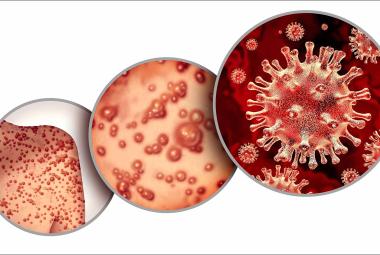Thyroid diseases are among the most common endocrine disorders encountered during pregnancy. The prevalence of hyperthyroidism (overactive thyroid) during pregnancy ranges from 0.05 to 0.2%. The most common causes of hyperthyroidism during pregnancy are Graves’ diseaseand hCG-mediated hyperthyroidism such as gestational transient hyperthyroidism, hyperemesis gravidarum (intractable nausea and vomiting), and gestational trophoblastic disease. Other causes of hyperthyroidism include toxic adenoma, subacute thyroiditis, and induced thyroxine overdose.1, 2
Poorly controlled hyperthyroidism during pregnancy has been associated with many maternal and fetal risks. The most common complication of hyperthyroidism in pregnant mothers is preeclampsia. Other reported complications include miscarriage, pre-term labor, heart failure, and stillbirth. Fetal risks include low-birth-weight infants, induced fetal hypothyroidism, and fetal thyrotoxicosis.1, 3, 4
The signs and symptoms of hyperthyroidism during normal pregnancy include heat intolerance, fatigue, anxiety, increase perspiration, tachycardia (increase heart rate), hand tremor, severe nausea and vomiting, and weight loss despite a normal or increased appetite.1 Specific findings such as goiter and exophthalmos (protruding eyes) suggest Graves' hyperthyroidism. Other manifestations such as confusion and abnormally increased metabolic rate characterize a very rare life-threatening complication known as thyroid storm which can be precipitated by labor, infection, cesarean section, or gestational trophoblastic disease.5
The diagnosis of hyperthyroidism during pregnancy is based upon clinical manifestations and laboratory findings. Values of < 0.1 mU/L of serum TSH and elevated thyroid hormone levels (serum free T4 and/or free T3 or total T4 and/or total T3) that exceed the normal range for pregnancy.5 In addition, the presence of TSH receptor antibodies is diagnostic of Graves' disease.6 Radioactive iodine is contraindicated in the diagnosis of hyperthyroidism during pregnancy because it crosses the placenta and induces fetal hypothyroidism and increased risk of thyroid carcinoma.7
Treatment options for pregnant women with overt hyperthyroidism are limited because therapy may be harmful to the fetus. However, a good fetal and maternal outcome depends upon controlling the mother's hyperthyroidism.7 Especially, aggressive treatment for thyroid storm is critical to the patient’s survival. According to the Endocrine Society and the American Thyroid Association (ATA), the goals of treatment are to provide symptomatic relief, to keep fT4 (free T4) levels in the upper third of normal (normal range of fT4 : 0.8-1.2 ng/dL for first trimester, 0.6-1.0 ng/dL for second trimester, and 0.5-0.8 ng/dL for third trimester), and to rapidly achieve and maintain euthyroidism (normal thyroid state) with the lowest effective antithyroid doses.1
Symptomatic women and/or moderate to severe overt hyperthyroid women, which are due to thyroid storm, Graves’ disease, toxic adenoma, toxic multinodular goiter, or gestational trophoblastic disease, all require therapy treatment. However, asymptomatic mothers with subclinical and/or mild hyperthyroidism such as hCG-mediated hyperthyroidism may be followed with no treatment. These women may need their TSH and free T4 measured every four to six weeks.7
The recommended treatment for hyperthyroidism in the first trimester of pregnancy is propylthiouracil (PTU) ≤ 50 mg twice daily, then switching to ≤ 5 to 10 mg daily of methimazole at the start of second trimester. Higher doses can result in fetal goiter and hypothyroidism. This requires assessment of free T4 (and/or total T4) frequently with appropriate adjustment of medication.7
The Endocrine Society and ATA suggest that radioiodine therapy is absolutely contraindicated in pregnant women with hyperthyroidism. They also do not recommend nonradioactive iodine for long-term use because chronic use can cause fetal goiter. However, they do suggest thyroidectomy in hyperthyroid women during pregnancy when thioamides (thyroid drugs) are not tolerated due to allergy or blood disorders such as agranulocytosis. Such women should be treated with a short course (7 to 10 days) of beta blockers and iodine in preparation for thyroidectomy.7 Beta blockers can be used for symptomatic relief in severe cases but only short period of few weeks. However, used for prolonged periods of time, it can cause intrauterine growth restriction and hypoglycemia.1
Lylla Ngo, M.D
Thomas Hale, Ph.D
Infantrisk Center
References:
- DeCherney A, Nathan L, Laufer N, Roman A. Current diagnosis & treatment : obstetrics & gynecology. 11th ed. ed. New York: McGraw-Hill/Medical; 2013.
- Ross D. Overview of thyroid disease in pregnancy. UpToDate; 2014.
- Luewan S, Chakkabut P, Tongsong T. Outcomes of pregnancy complicated with hyperthyroidism: a cohort study. Arch Gynecol Obstet. Feb 2011;283(2):243-247.
- Refetoff S, Weiss R, Grasberger H. Resistance of thyrotropin and thyrotropin releasing hormone. UpToDate; 2014.
- Ross D. Hyperthyroidism during pregnancy: Clinical manifestations, diagnosis, and causes. UpToDate; 2012.
- Davies T. Pathogenesis of Grave's disease. UpToDate; 2013.
- Ross D. Hyperthyroidism during pregnancy: Treatment. UpToDate; 2014.







